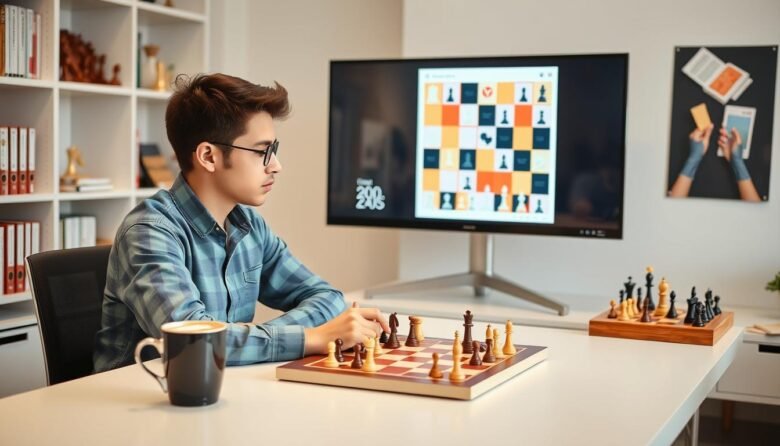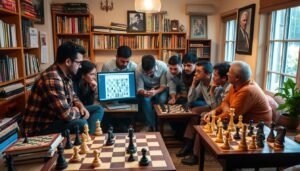In the world of chess, setting clear goals is key for skill improvement. For beginners, understanding and setting goals is essential. It helps them move from basic understanding to more advanced skills.
By setting beginner chess objectives, players can follow a clear learning path. This approach boosts engagement and leads to significant skill growth.
Understanding the Importance of Setting Chess Goals
Setting chess goals is key for every player, especially beginners. Clear goals guide players through the game’s complexities. By setting specific learning goals, players stay focused and motivated. They see real progress as they hit beginner milestones.
Benefits of Goal Setting in Chess
Goal setting in chess offers many benefits:
- Increased motivation: Clear goals inspire players to practice regularly.
- Structured learning: Goals help organize training and gameplay.
- Measurable progress: Tracking achievements shows improvement and guides strategy changes.
- Boosted confidence: Achieving milestones boosts belief in one’s abilities.
How Goals Influence Progress
Goals greatly impact a player’s chess growth. Pursuing learning goals leads to skill challenges. Meeting these milestones boosts game understanding and develops critical thinking and strategy.
This goal-setting and skill-building cycle leads to ongoing improvement. It also makes playing chess more enjoyable.
Identifying Beginner-Level Chess Goals
Setting clear goals is key for new chess players. They help track progress and keep motivation high. These goals shape the learning journey and lead to big wins for beginners.
Short-Term Goals for New Players
New players should aim for a few easy goals. These can be:
- Mastering the basic rules of chess, like how pieces move and basic checkmate patterns.
- Playing a set number of games each week to stay consistent.
- Learning simple tactics, such as forks, pins, and skewers, to improve gameplay.
Long-Term Goals for Rookie Players
As players grow, they can set bigger goals. These can include:
- Achieving a specific rating on chess platforms, showing growth and tactics understanding.
- Mastering specific openings to build a strong personal repertoire.
- Entering local tournaments to get competitive experience.
Learning the Basics of Chess Strategy
For beginners, understanding basic strategies is key. It helps build a strong chess foundation. Important tactics include controlling the center, moving pieces well, and keeping the king safe. These basics guide you in mastering chess.
Fundamental Strategies for Beginners
New players should focus on these basic strategies:
- Control the Center: Dominating the central squares gives more mobility and strength.
- Piece Development: Move pieces from their starting spots to better squares for more influence.
- King Safety: Keep the king safe by castling and avoiding open positions.
Common Mistakes to Avoid
Beginners often make mistakes that slow their progress. Knowing these mistakes helps in learning chess:
- Neglecting Development: Not moving pieces can limit your options and chances for success.
- Overextending Pieces: Pieces too far from support can be weak.
- Ignoring King Safety: Not protecting the king can lead to checkmate or losing a lot of material.
Enhancing Tactical Skills in Chess
Improving your tactical skills is key for beginners to get better at chess. Solving puzzles helps you learn important patterns like forks, pins, and skewers. These puzzles sharpen your decision-making and help you reach your chess goals.
Practicing Tactics Through Puzzles
Regularly solving puzzles boosts your ability to spot key positions on the board. Start with simple puzzles and move to harder ones as you get better. This way, you improve your analytical skills and feel more confident in your game.
Resources for Tactical Training
Many platforms offer great resources for tactical training for beginners. Sites like Chess.com and Lichess.org have tools made just for novices. They offer puzzles at different levels and track your progress, helping you on your chess journey.
Developing Opening Repertoire as a Beginner
For new players, building a strong opening repertoire is key. It sets the stage for winning games. Knowing different chess openings helps meet beginner goals. Each opening has its own rules and strategies.
Popular choices like the Italian Game and the Sicilian Defense are great for beginners. They offer a solid foundation for chess goals.
Understanding Common Chess Openings
Every chess opening has its own special traits. The Italian Game focuses on quick development and center control. This lets players put pressure early.
The Sicilian Defense, on the other hand, uses a counter-attacking style. It can catch opponents off guard. Learning these openings boosts confidence and strategic understanding.
Tips for Selecting Your Opening Strategy
Choosing the right opening strategy is crucial. Here are some tips:
- Focus on a few openings: Start with two or three that fit your style.
- Learn the key principles: Focus on piece development, center control, and king safety.
- Practice regularly: Regular practice strengthens your opening strategies.
- Analyze games: Review past games to see how well your openings work and make changes as needed.
Improving Endgame Knowledge
Learning endgame techniques is key for beginners aiming to reach their chess goals. Mastering basic endgame strategies can greatly affect game outcomes. By focusing on these techniques, players can improve their ability to win or defend games, marking important milestones.
Basic Endgame Techniques to Master
New players should start by learning a few essential endgame techniques. These are the building blocks for more advanced strategies. Here are some critical skills to work on:
- King and pawn versus king: Knowing how to promote a pawn is crucial.
- Basic checkmates: Learning patterns like king and queen versus king is vital.
- Opposition: Gaining opposition can lead to winning the endgame.
Resources for Endgame Practice
There are many resources to help beginners improve their endgame skills. Books and online tutorials cover these important topics. Here are some valuable resources:
- Chess Endgames for Beginners by John Nunn – a practical guide.
- Online chess platforms with endgame training tools.
- YouTube channels focusing on endgame strategies for novices.
Utilizing Online Chess Platforms for Improvement
Online chess platforms are full of resources for players looking to get better. They offer tutorials, puzzles, and game analysis to help improve skills and understand strategies. Sites like Chess.com and Lichess.org are great for beginners because they have lots of features.
Recommended Websites and Apps
Looking at different online chess platforms can really help your learning. Here are some top picks:
- Chess.com – It has lots of tutorials and articles for beginners. Plus, it has puzzles and drills to practice.
- Lichess.org – It has a simple interface and lots of resources. There’s a special analysis board and puzzles from the community.
- ChessKid.com – It’s made for young players. It’s a safe place with fun content to make learning fun.
How to Use Online Tools Effectively
To get the most out of online chess platforms, set clear learning goals. Beginners should pick specific skills to work on, like tactics or openings. Use the tools on these sites to track your progress and stay motivated.
Playing in online tournaments regularly can really help you get better. Many experienced players say using these tools has sped up their learning. It makes learning chess exciting and effective.
Joining a Chess Community or Club
Being part of a chess community or club can really boost your fun and skill in the game. It helps you make friends who love chess, which is key for beginners. Clubs offer a place to learn and grow together, helping you reach your chess goals.
Benefits of Social Interaction in Chess
Playing chess with others has many benefits:
- Mentorship Opportunities: You can learn from players who know more than you.
- Motivation: Talking about your chess journey can make you want to do better.
- Friendly Competition: Club tournaments help you get better by competing in a fun way.
- Learning Together: Working together makes learning more fun and helps you feel part of a community.
Finding Local or Online Clubs
Finding a chess club is easy:
- Look online for clubs in your area.
- Check places like community centers, libraries, or schools for chess groups.
- Join online sites like chess.com or lichess.org to meet other players.
- Go to workshops or tournaments to meet people and find clubs.
Setting Up a Regular Practice Schedule
Creating a regular practice schedule is key for anyone aiming to improve at chess. A structured training plan helps solidify what you learn. It ensures you cover all aspects of skill development.
By dividing your practice time among theory, exercises, and game review, you boost your performance. This balanced approach is essential for beginners.
Creating a Balanced Training Plan
A good training plan includes different parts to cover all chess aspects. Beginners should aim to include these in their routine:
- Theory: Study chess basics, like openings and endgames.
- Tactics: Spend time solving puzzles to improve pattern recognition.
- Analysis: Review games to spot mistakes and learn from them.
- Play: Play online or in local tournaments to apply what you’ve learned.
Importance of Consistency in Learning
Regular practice is crucial for chess improvement. It makes learning stick and builds muscle memory for moves. Setting goals keeps you focused and motivated to keep practicing.
With consistent effort, you’ll gain a deeper understanding of chess. This can lead to better performance and competitiveness.
Tracking Progress and Adjusting Goals
It’s key to keep an eye on your chess growth to get better. By looking back at your wins and losses, you can spot your strong and weak points. This helps you set new, achievable goals for your chess game.
Looking at past games helps you see patterns in your play. This makes it easier to work on areas that need improvement. Reflecting on your progress boosts your motivation as you see your skills grow.
How to Reflect on Achievement and Set New Goals
Tracking your chess progress means reviewing your game results and stats. Looking at your wins and losses can give you important insights. Setting new goals based on these reflections helps you grow more.
Using online tools to analyze your games can be very helpful. These tools offer stats and analysis that can guide you. Changing your goals as you improve keeps your chess journey exciting and rewarding.
Tools for Monitoring Chess Improvement
Using tools like chess journals or apps can really help you track your progress. Writing down your games, techniques, and areas to improve can motivate you. Apps for chess training also track your performance, showing how you’ve improved over time.
By adjusting your chess goals based on this data, you keep moving forward in your chess journey.




